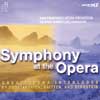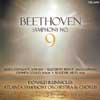Beethoven Symphony No 9
Serious-minded interpretations – but where is the intensity of Runnicles in the pit?
View record and artist detailsRecord and Artist Details
Composer or Director: Leonard Bernstein, Benjamin Britten, Dmitri Shostakovich
Genre:
Orchestral
Label: Arabesque
Magazine Review Date: 10/2003
Media Format: CD or Download
Media Runtime: 65
Mastering:
Stereo
DDD
Catalogue Number: Z6764

Tracks:
| Composition | Artist Credit |
|---|---|
| West Side Story |
Leonard Bernstein, Composer
Donald Runnicles, Conductor Leonard Bernstein, Composer San Francisco Opera Orchestra |
| Peter Grimes, Movement: Interlude (Dawn) |
Benjamin Britten, Composer
Benjamin Britten, Composer Donald Runnicles, Conductor San Francisco Opera Orchestra |
| Peter Grimes, Movement: Interlude (Storm) |
Benjamin Britten, Composer
Benjamin Britten, Composer Donald Runnicles, Conductor San Francisco Opera Orchestra |
| Peter Grimes, Movement: Interlude (Sunday morning) |
Benjamin Britten, Composer
Benjamin Britten, Composer Donald Runnicles, Conductor San Francisco Opera Orchestra |
| Peter Grimes, Movement: Passacaglia |
Benjamin Britten, Composer
Benjamin Britten, Composer Donald Runnicles, Conductor San Francisco Opera Orchestra |
| Peter Grimes, Movement: Interlude (Moonlight) |
Benjamin Britten, Composer
Benjamin Britten, Composer Donald Runnicles, Conductor San Francisco Opera Orchestra |
| Lady Macbeth of the Mtsensk district, Movement: Intermezzos |
Dmitri Shostakovich, Composer
Dmitri Shostakovich, Composer Donald Runnicles, Conductor San Francisco Opera Orchestra |
| Lady Macbeth of the Mtsensk district, Movement: Passacaglia |
Dmitri Shostakovich, Composer
Dmitri Shostakovich, Composer Donald Runnicles, Conductor San Francisco Opera Orchestra |
| Lady Macbeth of the Mtsensk district, Movement: Elegy |
Dmitri Shostakovich, Composer
Dmitri Shostakovich, Composer Donald Runnicles, Conductor San Francisco Opera Orchestra |
Composer or Director: Ludwig van Beethoven
Genre:
Orchestral
Label: Telarc
Magazine Review Date: 10/2003
Media Format: CD or Download
Media Runtime: 69
Mastering:
Stereo
DDD
Catalogue Number: CD-80603

Tracks:
| Composition | Artist Credit |
|---|---|
| Symphony No. 9, 'Choral' |
Ludwig van Beethoven, Composer
Alastair Miles, Bass Atlanta Symphony Chorus Atlanta Symphony Orchestra Donald Runnicles, Conductor Elizabeth Bishop, Mezzo soprano Ludwig van Beethoven, Composer Mary Dunleavy, Soprano Stephen Gould, Tenor |
Author: Andrew Farach-Colton
Given Runnicles’ experience as an opera conductor, one might expect the finale to be the performance’s high point. But though Runnicles’ tempi are well-chosen and there are some lovely orchestral details to savour – the delicate colouration of the ‘Turkish March’, for instance – there is precious little drama. Soprano Mary Dunleavy tends to drown out the other vocal soloists, and the choral singing is strangely subdued, though in the latter case, the recording balance seems to be at fault. The Adagio stands out; Runnicles immediately establishes an atmosphere of enveloping warmth and real innigkeit, aided by warm, cultured playing from the ASO strings. If only the remainder of the interpretation were so uplifting.
‘Symphony at the Opera’ is an odd programme yet it provides a considerably more impressive demonstration of Runnicles’ musicianship. One is swept up into the grim world of Shostakovich’s opera Lady Macbeth of Mtsensk by the manic intensity of the San Francisco Opera Orchestra’s playing. Slightly slower tempi might have yielded greater bite in the last three entr’actes, but the frenzied pace certainly sets one’s pulse racing. And Runnicles establishes a striking affinity between Shostakovich’s score and Britten’s Peter Grimes with a similarly uncompromising performance of the Passacaglia and Four Sea Interludes. ‘Dawn’ is painted in myriad shades of metallic grey, for example, and the nocturnal seascape of ‘Moonlight’ appears as a frozen image – the waves sharp-edged instead of undulating. Some details are lost in the fast-moving ‘Storm’, resulting in something of an Impressionist haze. Still, this is an individual interpretation well worth hearing.
I’ve never been a big fan of the suite from Bernstein’s West Side Story, and at first I was dubious about its appropriateness here. But Runnicles wisely wrenches the music free from its Broadway roots, playing down the jazziness of the music in the Prologue, for instance. With such chiselled, rhythmically taut playing, there’s precious little swagger and absolutely no swing. For once, the title Symphonic Dances seems apt. The ‘Cha-Cha’ and ‘Fugue’ also have a refreshing, Stravinskian angularity, and I’ve never heard the finale played with so little sentimentality. It works. It must be noted, too, that Arabesque’s recording is just as vivid as Telarc’s and more naturally balanced.
Discover the world's largest classical music catalogue with Presto Music.

Gramophone Digital Club
- Digital Edition
- Digital Archive
- Reviews Database
- Full website access
From £8.75 / month
Subscribe
Gramophone Full Club
- Print Edition
- Digital Edition
- Digital Archive
- Reviews Database
- Full website access
From £11.00 / month
Subscribe
If you are a library, university or other organisation that would be interested in an institutional subscription to Gramophone please click here for further information.




